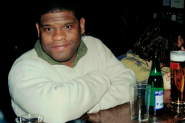John Wray: Wrestling on the Mississippi
24. February 2010 17:22
Michael March: In America one sells the end—not the beginning. Where do you come in—?
John Wray: I tend to like the middle—at least in terms of writing a draft of a novel because at both the end and the beginning one is trying to keep in mind the direction and the narrative—and the book should be moving—within the middle there is this wonderful omni-directional sphere—: like jelly in the middle of a doughnut—the novel becomes fluid in the middle—that groovy center that allows moving in a multi-directional way. So the middle is where I feel most at home.
MM: Your first novel—The Right Hand of Sleep—exposes your Austrian roots.
JW: My mother is Austrian—but my entanglements are American. In The Right Hand of Sleep I decided to write about events external to my immediate experience. Not wishing to stray too far—I took not so much my family history—but the part of the world that my mother came from as my point of departure—and worked that world from location.
MM: Your second novel—Canaan’s Tongue—envisions the slave trade at the time of the American Civil War.
JW: The opposite of an escape story—with the historical fiction of Canaan’s Tongue—I expressed my extreme anger and disgust with recent political events—which I had seen as political allegory.
MM: Alligator wrestling on the Mississippi—?
JW: Canaan’s Tongue is the story of a remarkable charlatan—the Redeemer—who comes of age in the final decades of slavery. He begins as a horse thief—develops into a sophisticated swindler—and finally comes up with the perfect crime—: he travels to the South posing as an agent of the underground railway convincing slaves in the deep South—and this actually happened—to run away from their plantations—then with his gang—simply re-sells the slaves to other plantations further up the Mississippi. A hundred percent profit undertaking—which blossoms into a large organization with shareholders—: an early prototype of the American corporation.
MM: Blackwater—on the Tigris and Euphrates—:
JW: Yes—especially as they made extensive use of religion—religious beliefs and rhetoric—in promoting their cause. This combination of commercial interest and religious rhetoric presented the perfect opportunity to talk about the Bush administration in America.
MM: For your third novel—Lowboy—you chose a young schizophrenic—who rides the New York subways.
JW: I sought to write a contemporary novel. I was always fascinated by subways—: my Austrian uncle was one of the designers of the Vienna subway system—when I was a child he often took me to visit subways under construction. In New York there is this whole mythology of an underground city—: the idea of a city underneath the city—unseen by daylight—seems an interesting way of looking at the subconscious.
MM: Who is Lowboy?
JW: He began as me—I was interested in writing a very humane, realistic portrait of a schizophrenic—: not romantic, nor in some way a reduction or a demonization of mental illness. For some time I was blocked—then I realized that I could use my own memories as a sixteen years old—so it began as a self-portrait—then became stranger and stranger—less and less related to me as the book progressed.
MM: Are you disappointed in yourself—?
JW: Not with the character of Lowboy.
MM: Still into the rhythm of the subways—?
JW: I naturally think more about the rhythm—sound—mood—of language than about my themes. The most important thing is to develop the sound—and the rhythm of the language—then I find that the events of the book rise out of the sound—out of the mood I am creating—: a kind of active nebula out of which events can emerge as stars.
MM: Your new novel emerges in Moravia.
JW: It begins in Southern Moravia—in a town called Znojmo—named Znaim in German—when the Habsburgs where still in charge. I have relatives who come from Moravia and Bohemia—so it’s a family portrait.
MM: How drunk is the family?
JW: How drunk are they—? They like their beer certainly—and they like their pickles. They are pickle manufacturers—a nineteenth-century family of autodidacts—who eventually—come to America.
1 January 2010—New York





-6507dcf8af9e0_160x60.jpg)
